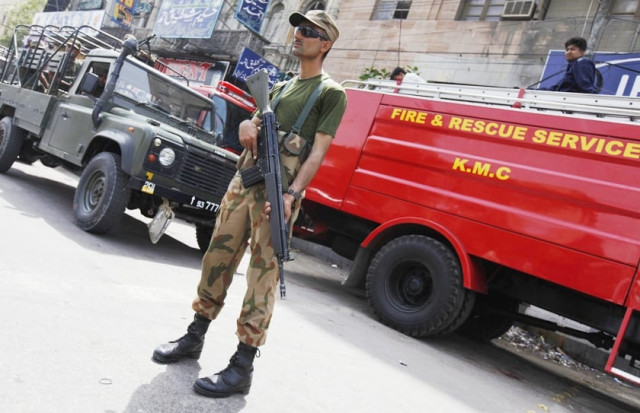Social and financial cost of a prolonged war
Nations engaged in conflict for long periods lose growth momentum.

After almost 12 years of fighting as a major player, Pakistan is standing at a stage where its economy faces the worst phase of the history. PHOTO: REUTERS/FILE
The path of economic development cannot be built in the absence of stability and national security.
It has been observed that almost all nations that come under the category of developed states adopted timely and effective policies in the past to counter internal and external security challenges and enjoy sustainable economic development.
It is also known that those states which continued to wage war lost the growth momentum, necessary for social development of people.
What happened in the economic sphere in Pakistan is the obvious outcome of an unending war against terrorism as focus shifts to this nation of 180 million people.
The war has diverted huge resources away from social development of the deprived with no immediate end in sight for the battle that has left its devastating impact on the entire country.
What has been achieved since 2001 when the war on terror began? The answer is that the country has gained nothing significant but has lost much including loss of more than 50,000 lives and a weak economy.
According to news reports, Pakistan has so far received around $15 billion from the US in the shape of Coalition Support Fund (CSF), an amount far lower than accumulated losses of $68 billion suffered up to fiscal year 2010-11. This shows that only 22% of the losses have been reimbursed by the US.
Apart from this, economic losses suffered as a result of the war have been estimated at $32 billion, taking the total to $100 billion over the past 12 years.
Another crucial fact is that more than 60% of the CSF has gone to the military account and the remaining 40% is utilised to offset the cost borne by different sectors of the economy.
The fragile economy has got assistance worth only $4.2 billion in different shapes and sizes including grants worth $1.5 billion, budgetary support of $1.2 billion and $1.5 billion in debt write-offs.
So the economy is a major loser in the face of growing security expenses and damage to lives, property and infrastructure. Total foreign liabilities, a trap for the economy, are also much lower than the losses borne in the war on terror.
After almost 12 years of fighting as a major player, Pakistan is standing at a stage where its economy faces the worst phase of the history.
A host of studies undertaken to determine the cost of the war has shown that besides the loss of lives and livelihood, the economic slowdown has come as a consequence of hefty spending on defence, compensation for damages, capital flight, low investment, ruined infrastructure and poor revenue collection.
Tourism was considered as the only industry that contributed massively to the livelihood of people living in war-stricken areas. However, after the destruction of the industry, people associated with it either got jobless or shifted to other sectors, overburdening and making inefficient the industries.
Similarly, productivity in sectors like agriculture and manufacturing came down as people migrated to relatively safer parts of the country.
After losing this much, the chances of an end to the conflict still appear slim. Any delay in exit may make conditions even tougher for the economy.
The writer hosts business talk shows on FM 101 and Radio Pakistan and is pursuing M Phil in Economics
Published in The Express Tribune, August 26th 2013.
Like Business on Facebook, follow @TribuneBiz on Twitter to stay informed and join in the conversation.



















COMMENTS
Comments are moderated and generally will be posted if they are on-topic and not abusive.
For more information, please see our Comments FAQ